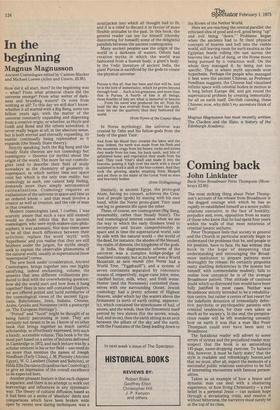Coming back
.John Lirtklater
Bach from Broadmoor Peter Thompson (Mowbrays £2.95) The most striking thing about Peter Thompson's account of his release from Broadmoor is the dogged courage with which he has so rapidly re-established himself as a senior public relations executive, in the face of hostility, prejudice and, even, opposition from so many of those who knew that he had spent four years within the walls of that most notorious of criminal lunatic asylums.
Peter Thompson feels that society in general and the Church in particular scarcely begin to understand the problems that he, and people in his position, have to face. He has written this book in the hope of deepening that understanding and encouraging the Broadmoor institution to prepare patients more thoroughly for release. He certainly pinpoints many startling deficiencies in the system but himself, with commendable modesty, fails to realise how untypical he is of the average Broadmoor patient. That attitude of cautious doubt which so distressed him would have been fully justified in most cases. Neither was Broadmoor strictly intended to be a rehabilitation centre, but rather a centre of last resort for the indefinite detention of irremedially defective, psychotic or psychopathic patients with criminal tendencies, for their own sakes as much as for society's. In the end, the perspicacious reader will be left wondering uneasily how on earth it was that a man like Peter Thompson could ever have been sent to Broadmoor.
The fastidious reader will advert to some errors of syntax and the prejudiced reader may suspect that the book is an astonishing 145-page, name-dropping exercise. To balance this, however, it must be fairly state; that the style is readable and refreshingly honest,and that we must, after all, expect the memoirs of a successful public relations executive to be full of interesting encounters with famous personalities.
Taken as an example of how a brave and dynamic man can deal with a shattering experience, or how living Christianity — a real belief in a personal Jesus — can sustain hope through a devastating crisis, and resolve it without bitterness, the narrative must surely be at the top of its class.


































 Previous page
Previous page